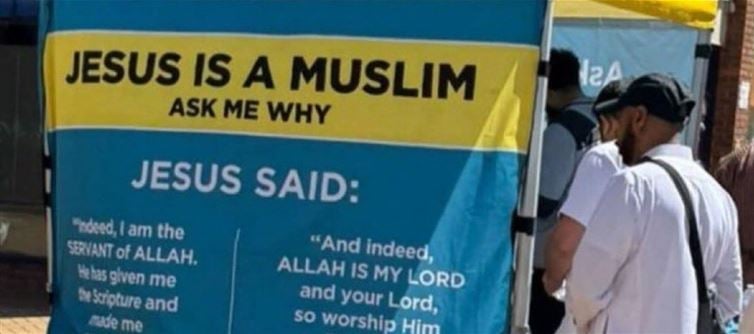
The photograph captures a blue and yellow tent, prominently displaying the provocative message "JESUS IS A MUSLIM ASK ME WHY" in large letters. The stall is equipped with additional text quoting the Quran, including Surah 19:30 ("Indeed, I am the servant of Allah. He has given me the Scripture and made me a Prophet") and Surah 19:36 ("And indeed, Allah is my Lord and your Lord, so worship Him. That is a straight path"). The tent also features an invitation to "Ask A Muslim" and a reference to Surah 3:59, which compares the creation of Jesus to that of Adam.
Historical Context
The claim that "Jesus is a Muslim" stems from Islamic theology, which views Jesus (known as Isa in Arabic) as a prophet and messenger of god, not the divine Son of god as in Christianity. According to the Quran, Jesus preached monotheism and submission to Allah, aligning with the definition of a "Muslim" (one who submits to God). Surah 3:59 and Surah 19:30-36 are cited to support this perspective, emphasizing Jesus' role as a servant of Allah and a precursor to Prophet Muhammad.
This interpretation contrasts sharply with Christian doctrine, which holds Jesus as part of the Holy Trinity. The stall's message is part of a broader Islamic outreach strategy to present Jesus as a figure within their faith, aiming to bridge understanding or convert individuals by challenging traditional Christian narratives.
Legal Implications
In the United Kingdom, freedom of expression and religion are protected under the Human Rights Act 1998, which includes the right to distribute religious materials in public spaces, provided it does not incite hatred or violence. The presence of these stalls aligns with this legal framework, and there is no evidence of arrests for similar Christian activities, though perceptions of bias persist.
The controversy also touches on broader issues of multiculturalism and integration. Critics argue that such displays challenge the dominant Christian heritage of the UK, while supporters see them as a legitimate part of a diverse society. The alleged double standard may stem from heightened scrutiny of religious activities in the wake of security concerns, though this remains speculative without specific legal data.
This event in london reflects global tensions over religious outreach and the role of public spaces in multicultural societies. The use of Jesus as a point of connection highlights a strategic effort to engage with Christian-majority populations, but it also risks alienating those who see it as a distortion of their faith. The debate mirrors similar discussions in other Western cities where Islamic visibility has grown, prompting questions about tolerance, identity, and the limits of proselytism.




 click and follow Indiaherald WhatsApp channel
click and follow Indiaherald WhatsApp channel